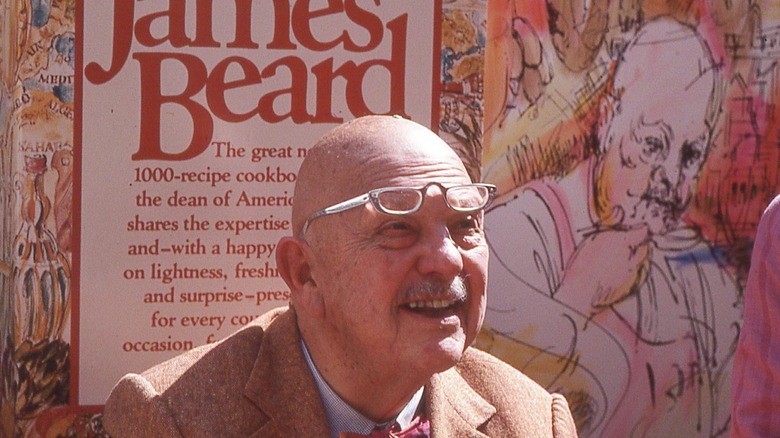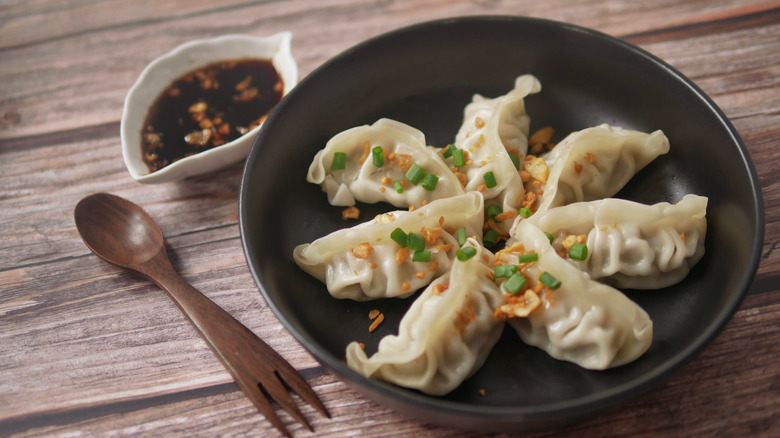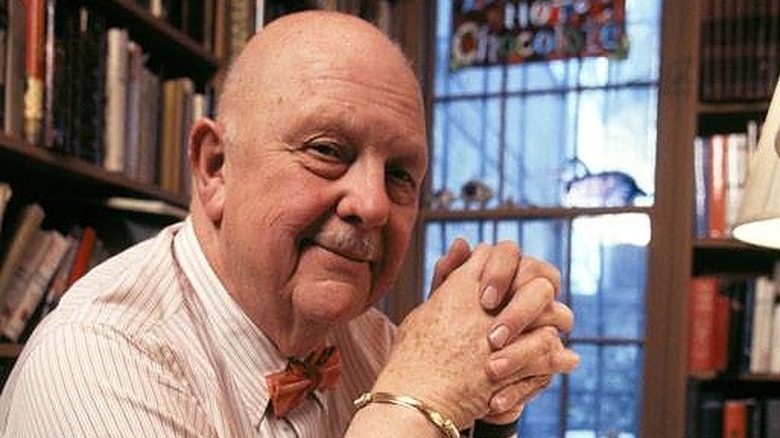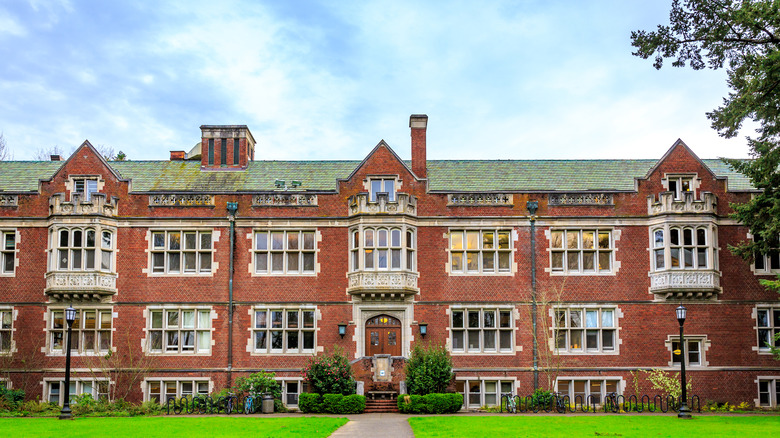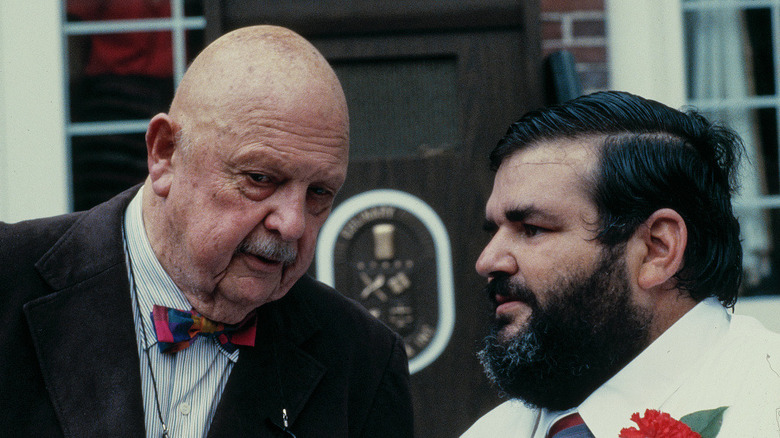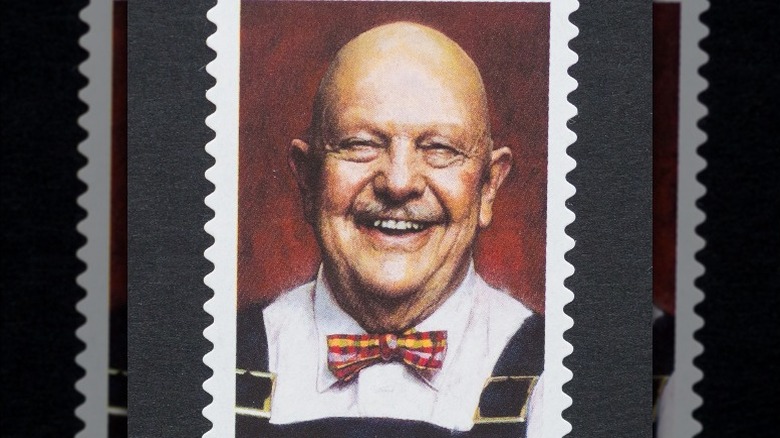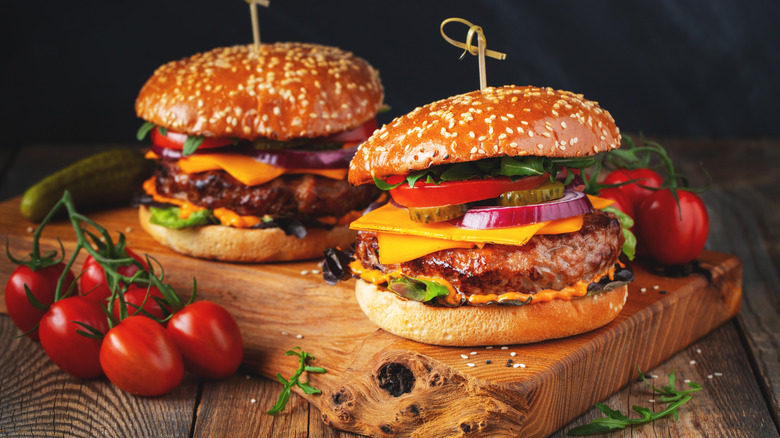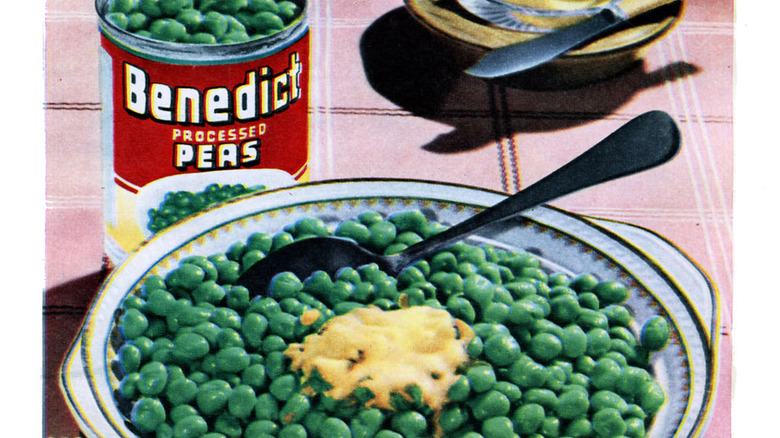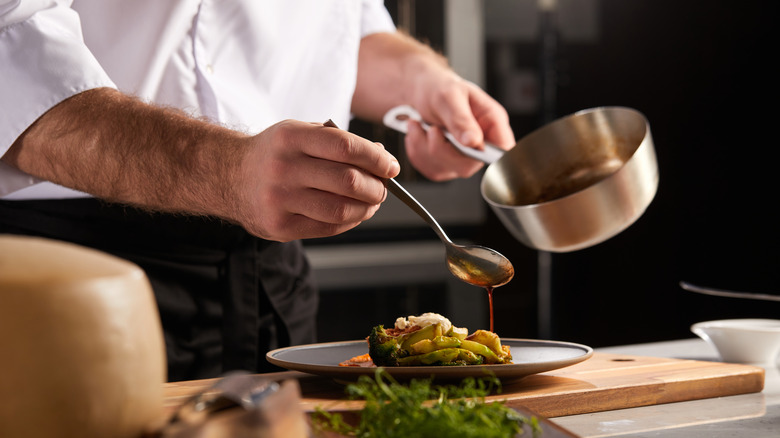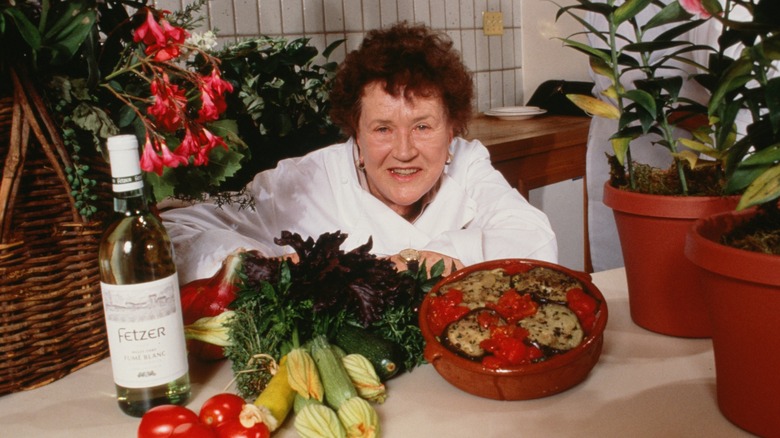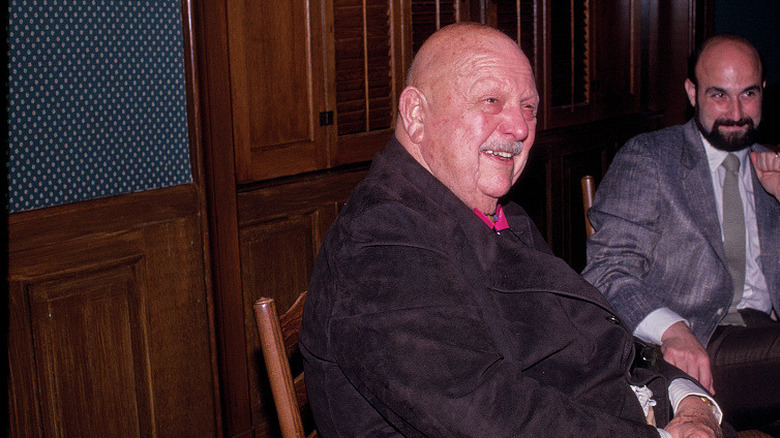The Untold Truth Of James Beard
Throughout his lifetime, James Beard came to represent a powerful image to Americans. As a jolly man who stood over six feet tall, he exerted an equally enormous influence over the country's food industry. He essentially created it from scratch back in the days of post WWII, when anything seemed possible and newfound wealth allowed the middle class to dream of eating beyond the filling but boring meat and potato basics that most Americans subsisted on.
Although he had an idyllic childhood, complete with important food-related memories and experiences that he fondly recalled, Beard suffered as a young man from the relative intolerance of his day. He found his niche in New York City as a rare male food expert, dispensing good-natured yet authoritative advice to the swarm of housewives eager to expand their culinary horizons.
As his fame and reach grew, he came to personify the entire American food world, and his enthusiasm gave fellow countrymen permission to be excited about not only food, but specifically American food. Beard's legacy lives on today as a central name in the food world.
Beard was influenced by his upbringing in Oregon
James Beard grew up in Portland, Oregon, with a doting mother and distant father. As Travel Oregon describes, Beard's mother was a serious, adventurous, and demanding cook who insisted on obtaining only the best ingredients. This emphasis on food was an early inspiration for her son, who witnessed how meals could bring people together despite their differences.
During the summers, the Beard family headed to the coast, where the bounty of the sea mixed with the sandy, fertile soil made for a perfect opportunity to eat well. Beard later claimed this setting inspired his love of good food more than any other place (per Discover Our Coast). Vivid recollections like the joy of plucking shellfish from the sea and enjoying them freshly cooked and steaming hot led him on a culinary path.
For the early 20th century, the Beard household was unusually cosmopolitan. Beard's mother was British by birth (via Oregon Encyclopedia), and her cooking and hospitality reflected this international sensibility. This home experience helped shape Beard's conception of American food as an amalgam of influences, both foreign and domestic. He would eventually instill this notion in his readers and devotees across the country.
He grew up in a boarding house
Beard's mother made ends meet by running a boarding house in downtown Portland (via Jefferson Public Radio). Here, she used her expertise in the kitchen as a draw for long-term guests, who thought of her talents as an added value to their stay. This venture allowed her an unusual degree of independence at the time, and when she married John Beard in her late thirties, she considered herself on par in her endeavors.
From his birth, their son was nurtured with all the food he could eat — which, turned out to be quite a lot (per Culinate). As PBS explains, in order to provide only the best meals to her guests and family, Beard's mom was very demanding of her suppliers and taught her son to seek out only the finest ingredients. The young Beard thrived in the congenial boarding house environment, and the combination of good food and a rotating cast of travelers left an enduring mark on the fast-growing boy.
The family's Chinese cook was an early inspiration
As talented and driven as she was, Beard's mother could not feed all of the guests she put up in her boarding house. Enter Jue-Let, a Canton-born Chinese national who came to the U.S. and immediately found work as a cook. Trained in classical Cantonese cooking, he found his new home unreceptive to foreign foods and had to make due by learning to cook Western food to satisfy his new countrymen.
Beard's mother hired Jue-Let and proceeded to develop a complicated, contentious relationship with him. Being two excellent cooks, they each thought they were the final authority on how a dish should be prepared. According to Saveur, young Beard witnessed Jue-Let's integrity in the face of his mother's normally immovable personality and grew to respect him both as a cook and surrogate father-figure.
Jue-Let's influence on Beard during this foundational period lasted throughout his life. He would often profess a love and respect for Chinese cuisine that was well ahead of its time. A large part can be attributed to the traditional Chinese dishes and sensibility Jue-Let shared with the budding gourmand, such as congee, salt fish, and fresh lychee (via The New York Times).
He was an actor
Beard's mother was an imposing yet nurturing presence in his life. She adored her son and tried to afford him every possible opportunity. Naturally theatrical and with a flair for drama, Beard had an inclination towards acting that his mother actively encouraged. After a stint in college, he decided to pursue professional training and spent the early 1920s in London and Paris studying voice work (via PBS). This exposure to European culture was another step on his road to culinary authority.
After his studies, Beard joined a New York theater troupe before traveling to Los Angeles and receiving a few small roles in Hollywood movies. One of his enduring loves at the time was opera (per Tampa Bay Times), but he found himself unable to compete and regularly land the part. Seeking other ways to support himself, Beard soon settled on cooking to pay his bills.
This background in theater and acting was evident throughout the rest of his long life. His later television appearances, as well as his general personality, were informed by his acting training, and his commanding voice was considered a major asset in selling his jovial yet authoritative persona.
Reed college expelled him for homosexual behavior
James Beard was a gay man who had to live most of his life in the closet. When he was growing up in the 1920s and '30s, gay people were ostracized from polite society and had to hide their inner lives from the public. Beard was no exception, and the relative tolerance in today's society was unthinkable from his perspective. Unfortunately, he also had a run-in with this prejudice that cost him a chance at a college degree.
In 1921, while Beard was attending Reed College in Oregon, he was kicked out for having a sexual affair with a male professor. As humiliating as this was, considering Oregon laws at the time stipulated gay men could be castrated against their will (via Portland Monthly), it could certainly have been worse.
As Reed attests, it is hard to track down documentation of the expulsion because the college expunged all mention of Beard in their official records. Ostensibly, this was to protect his privacy, but it is equally as likely that the school was interested in insulating itself from scandal. After this event, Beard faced a great deal of stigma in his hometown. The solution was to ship him off to Europe for formal theater training.
Living in Paris helped broaden his horizons
Beard's time in Europe was a tonic after such an uncomfortable and embarrassing send-off. Unable to return home with his head held high — anti-gay sentiments were prevalent at the time — he went abroad at his mother's goading. Although he studied in both London and Paris, it was in the latter city that he felt most at home.
The famous food culture of the French struck a chord with a young man who felt adrift but still looked back on childhood memories of fine food with adoration. As Reed College reports, Beard soon recognized that his good humor and appetite for life (and food) made him an eligible date for social events where the food was always excellent and he could immerse himself in what felt like an entire country of gourmands.
Although Beard adored the culture and experience of living in Paris, once he ran out of money, he needed to find work to support himself. He returned across the Atlantic and sought work in the theater, though he remained inspired by the French way of life and food. In his later days, he tried to instill some of the same feelings of reverence in his fellow countrymen.
He made a living in NYC working in food
Once back in the U.S. with a stalled acting career, few prospects, and little hope of breaking through as a household name, Beard looked to a familiar comfort as a way to pay the bills: food.
In 1937, he founded Hors d'Oeuvre Inc., a small catering company that specialized in making small bites for upscale parties (per James Beard Foundation). Many of his cocktail party recipes became smash hits in New York society and, as The New Yorker describes, the small business had an outsize influence on the tastes of mid-century Manhattan.
This new career was interrupted by the calamity of World War II. Although he was not exactly fit, Beard did his patriotic duty and joined the armed forces when the U.S. entered the war against the Axis powers (via PBS). Since he was unsuited for combat, he started out as a codebreaker but was soon back in his element when he was charged with setting up sailors' canteens all over the world.
After the war, he returned to New York more determined than ever to establish himself as a culinary authority and make a name for himself. Although Beard had published one book before he left for service, his career soon began to take off.
Writing books helped him reach a wider audience
After his stint in the war, Beard wanted to make a bigger name for himself and reach a wider public. As veterans began returning home and wartime factories were converted to peacetime pursuits, Americans were open to new technology and prepared to spend money to acquire it (via History.com). This meant that Beard was in the perfect place to step up and educate a relatively ignorant country on the joys of good food.
This began prewar when he published both a companion book to his catering company called "Hors d'Oeuvre and Canapés," as well as a book on al fresco cooking called "Cook It Outdoors" (per JamesBeard.org). After he returned from service, his pace quickened and Beard authored over 20 books on various food-related topics.
Single subject books covered favorites like poultry, bread, fish, and casseroles. However, it was his more personal — and wide-ranging — books that cemented his reputation. Books like "Delights and Prejudices," published in 1964, combined recipes with a memoir-like format to give readers a peek into the life of the famous food authority.
The book he was most proud of was the weighty tome "James Beard's American Cookery," published in 1972. Here, Beard laid out his perspective on regional American food and often provided a history lesson along with the recipes, putting into context the seemingly chaotic organization of the nation's cuisine.
American cuisine was his favorite
Beard's devotion to American food was not limited to one book. Although he drew inspiration from other countries (in particular France), he was a passionate believer in the potential of a home-grown food culture that reflected the people who called America home. He was, in fact, known as the "Dean of American Cooking" (via Oregon Encyclopedia), a title he richly deserved given his tireless advocacy for his fellow countrymen's accomplishments.
In many ways, Beard represented some of the contradictions present in the U.S. Although by this point he was firmly established in New York, thanks to a youth spent in Oregon he had a foot on both coasts and could authentically speak to local customs across the country. He also managed to champion freshly made, from-scratch cooking while simultaneously explaining how ingredients like frozen or canned vegetables could be turned into a decent meal.
The New Yorker details how a trip out west in the '50s helped him realize that the future of food in this country would not mimic the stuffy French cuisine popular at the time. Instead, he pictured a type of fusion cuisine, where international immigrants could combine their traditions with native produce and practices to come up with something uniquely American.
He attempted the first American TV cooking show
Because he was on the scene so early, Beard was able to pursue his love for cooking on a national stage with no other serious competitor. Julia Child herself declared, "In the beginning, there was Beard" (via Oregon Encyclopedia). One of his ventures entailed trying out what was then the experimental medium of television. The lure of broadcasting his opinions directly into people's households was strong and Beard leaped at the opportunity.
Guinness World Records declares Beard's 1946 show "I Like to Eat" as being the first American stand-alone cooking show. This milestone in both Beard's career and the American culinary landscape was significant even if it only lasted about eight months. The experiment paved the way for what proved to be the breakout hit of the genre: Julia Child's "The French Chef," which premiered over ten years later in 1961 (per WGBH).
This desire to take a chance to reach a bigger audience was very typical of Beard at the time. He saw a wide-open field and himself as a pioneer, eager to exploit every advantage thrown his way. Given his training in the theater, he also considered himself a natural fit for a role as a television star. Unfortunately for him, his television career went about as well as his original stage acting career did.
To help make ends meet, he endorsed brands
However, all those cookbooks — and there were quite a few — never really brought in the kind of money that Beard craved. He turned to product endorsements as a way to earn extra cash, even becoming a spokesman for various products that he personally didn't care for in order to make ends meet (via The New York Times).
This necessity sometimes depressed the normally affable Beard, and he would write to companions about the pain of having to shill for companies that ran counter to every tenet of good food he believed. His pointed complaints described a man who felt overwhelmed by the demands placed on him by the brands he promoted (per The Atlantic).
One of the reasons Beard was so well-respected — and his endorsements given such weight — was the fact that up to this point, the world of cooking was widely considered a pursuit only fitting for women. That he was not only a man but a tall, robust one at that, added significance to what he said, especially at a time when women were widely relegated to the home and domestic affairs. However, his status as a gay man was kept from the public for fear that it would undercut his appeal.
He supposedly had a perfect taste memory
Thanks to his omnipresence in the American food world, Beard's opinion became a coveted prize by those seeking to make a name for themselves. He was well-known for making pronouncements and expecting them to be followed like gospel. This was something he picked up from his mother, who gave great credence to his opinions and taught him to stick to his guns.
One aspect he was very confident about was his taste memory, which he likened to perfect pitch. Beard claimed to be able to recall with perfect accuracy the taste of any given dish or ingredient. This included childhood meals, like his mother's home-canned white asparagus or her famous razor clam chowder (via The Orange County Register). It also meant that rather than being attached to a particular person's cooking, he tended to rhapsodize about specific dishes.
This remarkable ability served him well as a restaurant critic, though he pursued this in more of a freelance capacity rather than full-time. He was also asked to consult with the founders of the iconic Four Seasons restaurant in New York, which had the revolutionary (at the time) idea of strictly serving food that was in season, rather than the year-round sameness that characterized most American cooking in that era (via The New York Times).
Many other food personalities were close friends
Considering he was a founding member of the American food community, it's no surprise that James Beard was close with other culinary luminaries. In fact, as Americans began to take food more seriously there was a general consensus that three figures dominated the landscape and shaped tastes more than any others: Julia Child, New York Times restaurant critic Craig Claiborne, and — naturally — James Beard (via Chicago Tribune).
Child's chummy relationship with Beard is well documented and was even featured on the HBO series "Julia," in a memorable series of scenes set in San Francisco (per Town and Country). However, Beard's culinary connections did not stop there. He also cultivated relationships with most food celebrities of his time, and his endorsement or kind words could do wonders for an up-and-comer. The Washington Post revealingly reported on Beard's gossip about his relationships with various food figures such as MFK Fisher and the "Julia Child of Italian food," Marcella Hazan.
Once he had some commercial success, Beard was able to buy a townhouse in Greenwich Village, which became a sort of culinary mecca for those who fell into his orbit. Andrew Zimmern vividly describes attending events here as a boy, when his father and his father's partner would allow themselves to relax among sympathetic company (via The New York Times).
His health was a serious concern
Standing at an impressive 6 foot 2 inches tall, Beard was an imposing figure. Add in his weight (he tipped the scales at over 300 pounds) and he was a larger-than-life man, whose zest for cooking and eating was not only contagious but self-evident too. However, as much as these qualities were part of his charm, they began to have a deleterious effect on his health as he aged.
As The New York Times reported back in 1976, after developing cardiac issues, Beard was placed on a strict diet to eliminate his intake of both salt and fat. Naturally, this was a huge blow to such a hearty and dedicated eater, and he struggled with this dictum for the rest of his life. He was never able to fully divorce himself from the pleasures of the table and suffered several relapses over the course of the next decade.
He did not, however, allow these setbacks to slow him down. He founded several cooking schools and even conducted classes in a wheelchair when he was too ill to stand (via Oregon Encyclopedia). His enthusiasm was such that a mere trifle like a heart attack wasn't about to stop him from doing what he loved.
The most prestigious American food awards are named after him
It's a funny twist of fate that most Americans today know James Beard not as the man, but as one of his principal legacies: a series of culinary awards. Some of his closest friends and associates formed a foundation in his name after his death. This organization — based in his Greenwich Village townhouse — continued his work of elevating American food and celebrating the accomplishments of national culinary professionals.
The annual bestowing of James Beard Awards has become akin to the Academy Awards of the food world, where chefs, restaurateurs, cookbook authors, and more are recognized for their superlative achievements. While this may seem like a relatively uncontroversial mission, the awards have not been without their drama.
A few stresses were placed on the James Beard Foundation in recent years due in part to the COVID-19 pandemic as well as accusations of racial bias that plagued the awards in 2020. Additionally, an oversight panel took issue with the seeming lack of transparency in the process of choosing winners. The members of the foundation have since vowed to do better and true to their word, the 2022 nominees were the most diverse thus far (via Forbes).
Winning one of these coveted awards can change a chef's life overnight, although it is not a sure bet to ensure a packed restaurant night after night (per Seattle Met). Still, the recognition and prestige associated with a win are very real.
